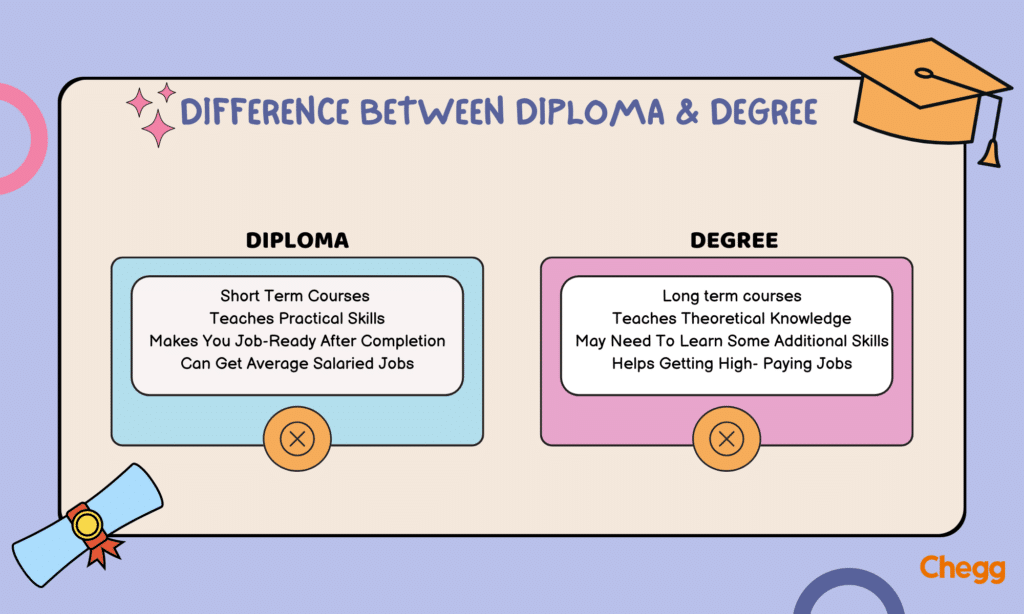

Quick Summary
- A degree is a higher-level academic qualification typically requiring 3-4 years, while a diploma is a shorter qualification usually completed in 1-2 years.
- Fees are higher for degree courses at universities while diploma courses are more affordable options since they have shorter timelines.
- A degree offers an all-rounded study of the subject, while a diploma is an in-depth study of a particular topic or skill.
Table of Contents
Introduction
A degree or diploma is the dilemma of every student.
With nearly 4 crores of students pursuing higher education in India, having a clear answer to this question is very crucial.
To make informed and right decisions regarding your education, you need to know the difference between diploma and degree.
Here in this article, you will get to know the meaning, types, pros and cons and much more.

Difference Between Diploma And Degree- An Overview
|
Core area |
Degree |
Diploma |
|
Meaning |
A degree is an undergraduate or postgraduate program after a particular study at a specific level. |
A diploma is a certificate given to a student after a specific course. |
|
Eligibility |
Higher Secondary |
Highschool |
|
Time |
2–4 years |
6–12 months |
|
Fee |
Comparatively high |
Comparatively low |
|
Admission |
Annually |
Half-yearly and annually |
|
Awarded by |
Colleges and universities |
Universities, colleges, and private institutions |
|
Salary |
Comparatively high |
Comparatively low |
|
Flexibility |
Yes |
No |
|
Conducted by |
Universities |
Universities, educational institutes, and private companies |
What is a Degree?
A degree, in its simplest form, means a formal recognition awarded by an educational institution, such as a college or university, upon the successful completion of a prescribed program of study.
It signifies the attainment of a certain level of knowledge, skills, and competence in a specific academic or professional field. Degrees are available across a wide range of disciplines, including but not limited to arts, sciences, business, engineering, humanities, and social sciences.
Types of Degree
There are four types of degrees: associate, bachelor’s, master’s, and doctorate.
- Associate degree – An associate degree is a vocational degree that trains a student in practicals and theory. Such a degree generally lasts for two years.
- Bachelor’s degree – A bachelor’s degree is one of the most popular types of degrees. It is opted for by students after 10+2 and is a 3–4 year program. Students are taught about particular subjects in detail.
- Master’s degree – The master’s degree is a specialized postgraduate degree that follows the bachelor’s degree. It generally lasts for 2 years.
- Doctorate – Doctorate degrees are studies following the master’s degree. In these high-level degrees, students conduct independent research about topics under the guidance of supervisors. Candidates generally take around 4–7 years to complete a doctorate.
What is a Diploma?
A diploma meaning a short-term course. It generally lasts 6 months to a year. Diplomas are offered by an institution, college, or university after completing a certain course.
These courses provide technical knowledge and job-ready skills which help the students become eligible for the job upon completion of the course. One can choose the diploma course according to the career they want to choose.
Types of Diplomas
- Post-Graduate Diploma- Post-graduate diploma degree is designed for individuals who have already completed their undergraduate studies and are seeking further specialization or career advancement in a specific field. Such diplomas are typically pursued after obtaining a bachelor’s degree and are considered a higher level of education.
- Undergraduate Diplomas- Undergraduate diplomas, also known as advanced diplomas or associate diplomas, are typically pursued after completing high school or secondary education. They provide specialized knowledge and skills in a specific field, like a bachelor’s degree but with a shorter duration.
Related Read:
10 Most In-Demand Diploma Courses Today
Difference Between Diploma And Degree- Advantages
| Diploma | Degree |
| A diploma teaches you the relevant skills and prepares you for a job role in a short span of time. | Enhances career growth prospects as recruiters know that you have professional know-how of the skills that a job demands. |
| A diploma teaches hands-on skills. Anyone can use these skills to land a variety of job roles, from stitching to carpentry. | A degree is proof that you have earned your skills. |
| A diploma degree can serve as a pathway to enter specific careers directly. | A degree puts you in contact with other people in the same field. |
| Individuals with diplomas may find it easier to secure entry-level positions and gain relevant work experience in their field of interest. | Individuals with a degree tend to earn higher salaries compared to those with diplomas or lower levels of education. |
| Diploma programs offer flexibility in terms of scheduling and course options. | Pursuing a degree equips you with a wide range of transferable skills. |

Difference Between Diploma And Degree- Disadvantages
| Diploma | Degree |
| A diploma degree is considered less important in some fields and industries. | The degree requires a longer time duration to get completed. |
| Individuals with degrees may have a higher earning potential compared to those with diplomas. | Obtaining a degree can be costly, especially at prestigious universities. |
| Diplomas typically offer a narrower scope of academic subjects compared to a degree program. | Degrees often encompass a broader range of subjects and provide more general education. |
Difference Between Diploma And Degree- Uses
| Diploma | Degree |
| A diploma offers additional qualifications and professional training. | A degree is a step towards advancing your career. You can build the foundation of your knowledge in a subject by pursuing a degree. |
| A diploma degree teaches practical ways of dealing with the job at hand. | A degree on one’s resume helps form a good impression on the recruiter. |
| A diploma degree can be an excellent option for individuals looking to enter the workforce quickly. | A degree offers the time to learn from and exchange ideas with people in one’s field. |
Key Difference Between Diploma and Degree
Are you confused about choosing between a degree or diploma?
Here is a list of some major difference between diploma and degree to make your choice easier.
- The diploma is a 6–12 month course. A degree takes a minimum of 3 – 4 years to complete.
- Almost all universities offer degrees and diplomas. Not all universities offer diplomas. Some private colleges, institutions, or diploma colleges offer them too. This is one of the most common differences between diploma and degree.
- Diploma courses are comparatively cheaper than degree courses. One can avail of a diploma course as a one-time investment. Degrees require one to pay an academic fee for a longer duration. This difference between the two is a deciding factor for several economically-challenged students.
- One can pursue more than one diploma degree certificate at the same time. One cannot pursue two degrees from the same or different universities at the same time.
- A diploma is generally pursued after grade 10, grade 12, or after a degree. A degree can only be pursued after grade 12.
- One gets extra one-two years to finish a degree since it is a long-term course. One must ensure they fulfil all the requirements for a diploma within the course duration. Otherwise, they will not receive the diploma certificate.
- A degree ensures a high-salary job and quick promotions in any field. A diploma does not offer excellent salary jobs when one is starting out.
- In degrees, there is deep learning of every concept. Diplomas mainly offer scope for hands-on learning. This difference between diploma and degree is important for students who have a planned career goal.
Diploma vs Degree – Which is Better?
Diploma or degree whatever you choose one thing is obvious you will get to gain knowledge. Now, the decision is whether you want to gain knowledge of practical skills of a specific job via a diploma degree. Or you want to gain theoretical knowledge of an industry or subject. The decision is yours, but be specific with what you want and choose the path that matches your interests, career prospects and circumstances.
To explore about numerous options of different degrees and diplomas deep dive into our guide on Career Advice.
Frequently Asked Questions
Which is better diploma or degree?
There is a difference between a diploma and a degree. Degrees are more beneficial in the long run. More recruiters choose employees with degrees rather than diplomas. However, many recruiters also hire individuals who have job-specific skills, which are learned by a diploma degree.
Is a diploma the same as a degree?
Diploma is better if you want to learn skills related to a specific job and a degree provides you with detailed knowledge of subjects. They both are different in terms of duration, specialization and importance according to the industry or career you choose. So, no diploma and degree are not same.
Is a Diploma higher than graduation?
No, the diploma is not higher than the graduation degree. Every individual has different goals; therefore, their choices may also differ. What matters is keeping in mind the difference between diploma and degree when opting for either and how the choice will affect their long-term goals.
Is a diploma good for a career?
Yes, diploma degree certificate is good for a career. As it provides you with the job skills which help you get into the selected field easily. Diploma makes you job-ready on the go so that you can get hired immediately.
To read more related articles, click here.
Got a question on this topic?